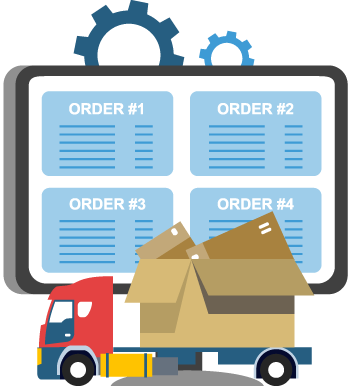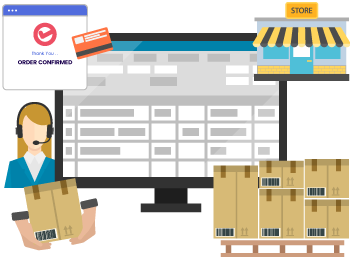The Importance of Effective Order Management and Fulfillment
Built For





Order management and order fulfillment play critical roles in achieving success. But what exactly are order management and fulfillment, and how do they impact the bottom line? In this article, we explore effective order management, how to ensure efficient order fulfillment, and how to improve the customer experience throughout the process. We also dive into the different technologies being utilized in order management and fulfillment, followed by the challenges and solutions faced in order management and fulfillment and how technology can provide solutions.
What is order management and fulfillment?

Definition of order management
Order management is a crucial aspect of business that involves the systematic process of receiving, processing, and delivering customer orders. Sales orders may originate from various locations: online marketplaces, eCommerce websites, direct sales teams, phone, fax, email, or via EDI. An efficient order management system streamlines the entire lifecycle of a customer order, from the moment a customer places it until it is successfully delivered to their doorstep or loading dock. Order management is vital in providing a seamless and satisfying customer experience, encompassing everything from inventory management and order processing to payment handling, managing returns or exchanges, and handling customer service.
Definition of order fulfillment
Order fulfillment refers to picking, packing, and shipping products in response to customer orders, ensuring that the right products are shipped to the right customers. Accurate order fulfillment is critical in ensuring customer satisfaction and maintaining a business’s reputation.
The connection between order management and fulfillment
The connection between order management and fulfillment lies in the fact that both processes are essential to delivering a seamless and satisfying customer experience. Order management is the first step in ensuring that the fulfillment process runs smoothly, as it involves receiving and processing customer orders, managing inventory levels, and handling any related tasks such as customer service and payment processing. On the other hand, fulfillment results from a well-organized order fulfillment system, ensuring that the correct items are picked, packed, and shipped to the correct customers promptly and efficiently. A synergy between order management and fulfillment is crucial for businesses to thrive and grow.
Importance of order management and fulfillment
Order management and fulfillment directly impact customer satisfaction and loyalty, as customers who receive their purchases promptly and as expected are more likely to return for future purchases. Efficient order management and fulfillment processes reduce the chances of human error, such as shipping the wrong product or delivering it to the incorrect address, which can be detrimental to a business’s reputation. Lastly, a streamlined order management and fulfillment process helps companies reduce costs and inefficiencies, ultimately boosting their bottom line.
What are the key elements of effective order management and fulfillment?
Inventory management

Inventory management is central in effective order management and fulfillment, as it helps businesses maintain accurate stock levels and prevent issues such as stockouts or overstocks, which can affect customer satisfaction. A well-implemented inventory management system allows companies to forecast demand, keep track of inventory turnover, and optimize their stock levels to match customer demand.
Order processing
Order processing encompasses everything from order entry and verification to fulfillment activities in warehouses and distribution centers. By streamlining order processing, businesses ensure that customer orders are handled promptly and efficiently, leading to quicker order turnaround times and improved customer satisfaction.
Payment processing
Handling payments securely and efficiently is essential to maintaining a seamless order management and fulfillment process. Payment processing includes accepting a variety of payment methods, processing refunds or chargebacks where necessary, and ensuring that customer data is kept secure and protected at all times.
Data analysis
Data analysis is indispensable, as it aids in understanding customer behavior, identifying trends, and making informed decisions based on historical data. The analysis of sales, inventory, and customer data allows businesses to:
- Identify opportunities for improvement.
- Predict demand.
- Optimize their order management and fulfillment processes accordingly.
Customer management and returns
Customer management involves providing exceptional, consistent customer service, promptly handling customer inquiries and complaints, and efficiently managing returns. Effective customer management practices are essential for maintaining a successful order management and fulfillment process, as they contribute to building a loyal and satisfied customer base.
How can order management and fulfillment software improve the order management and fulfillment process?

By providing a centralized platform for order processing, inventory management, and shipping coordination, order management and fulfillment software significantly enhances the order and fulfillment processes. The software automates various tasks, such as order tracking and stock availability, providing real-time visibility and streamlined operations. With centralized multiple channel order management, electronic data interchange (EDI) management, optimized picking, packing, and shipping, and customer service and returns tools, order management and fulfillment software enables businesses to achieve faster order fulfillment, reduce errors, improve customer satisfaction, and ultimately enhance overall operational efficiency.
Centralized multiple-order management
Order management and fulfillment software consolidates orders from various channels and sources, providing centralized multiple-order management. The platform allows businesses to process, track, and manage orders from multiple marketplaces, e-commerce sites, direct sales teams, and more in one centralized system, giving companies a unified view of their orders, inventory levels, and customer data. By centralizing order management, businesses streamline operations, enhance visibility, improve order accuracy and deliver timeliness, and increase overall customer satisfaction by providing consistent and efficient order fulfillment across all channels.
EDI management
EDI is a standardized format for exchanging business documents electronically, with EDI translation software acting as a mediator between trading partners, enabling the automated exchange of EDI documents such as purchase orders, invoices, and shipping notices. EDI management automates orders and processes between suppliers and customers within the order management and fulfillment software. By automating EDI management, businesses achieve increased efficiency and accuracy in order fulfillment operations.
Direct sales orders
Direct sales orders are sales made directly to customers by a sales representative. Order management software provides tools to generate quotes, convert them into orders with a single click, and facilitate order fulfillment. When receiving a direct sales order, the software captures all relevant order details, including customer information, product selection, and payment information, checks stock availability, and allocates the products for the order.
Optimized picking, packing, and shipping
Picking, packing, and shipping processes are optimized with order management and fulfillment software, improving the speed, accuracy, and cost-effectiveness of order management and fulfillment operations. Picking operations are streamlined by generating optimized pick lists that arrange items in the most efficient order for warehouse staff. Barcode scanning capabilities ensure accurate item selection and minimize errors. Real-time tracking information and order status updates enhance visibility and customer satisfaction.
Customer service and returns
Order management and fulfillment software facilitates customer service and returns management enabling businesses to centralize customer information, order history, and communication logs, empowering customer service representatives with quick access to relevant data for quality support. The software automatically notifies customers with updates, keeping them informed about their orders and providing tracking information. When a return is required, the RMA process is handled transparently and timely with organized returns records.
How can order management and fulfillment impact your profitability?

Reducing costs and inefficiencies
Efficient order management and fulfillment processes help businesses reduce costs and eliminate inefficiencies, ultimately driving the bottom line. By streamlining operations and improving workflow efficiency, companies reduce wasted resources, minimize overtime expenses, and save on shipping costs, leading to increased profitability.
Improving customer loyalty and satisfaction
Regardless of the product or order size, customers want easy, reliable order management and fulfillment – they want to receive what they purchased, delivered timely and in good condition. Businesses foster customer loyalty and satisfaction by providing a seamless experience throughout the order management and fulfillment process. Loyal customers are more likely to return for future purchases, recommend the business to others, and contribute to a positive brand reputation, all driving growth and profitability.
Increasing sales through streamlined processes
Streamlined processes involve clear communication and collaboration among departments, such as marketing, sales, warehouse, purchasing, and customer support, to ensure a seamless customer journey. By reducing out of stocks, increasing order accuracy, eliminating bottlenecks, and enhancing overall efficiency, streamlined processes enable sales teams to respond faster to customer inquiries, customer service representatives to provide personalized experiences, and a base of satisfied, loyal customers to be built, ultimately leading to increased sales and revenue.
Key performance indicators (KPIs)
Implementing KPIs, such as inventory turnover, order accuracy, order cycle time, and warehouse productivity, helps warehouse managers track performance, identify inefficiencies, and make data-driven decisions for continuous improvement.
Maximizing revenue potential with accurate inventory management
Ensuring proper employee training and management encourages a skilled and motivated workforce capable of contributing to efficient warehouse operations and delivering quality customer service experiences. Effective training programs should cover safety, equipment handling, inventory management tools, and warehouse management systems.
What are the challenges faced in order management and fulfillment, and how can technology solve them?

High order volumes and complexity
As a business grows, managing high order volumes and complexity is a significant challenge for companies, especially during peak seasons or promotional periods. The need to scale order management and fulfillment processes by investing in technology is common.
Order management and fulfillment software efficiently manages large volumes of orders by automating order processing and fulfillment tasks, reducing manual effort and processing time. It handles order complexity by integrating multiple sales channels into a centralized platform, ensuring seamless management across various channels and minimizing errors. The software helps businesses meet customer demands, improve operational efficiency, and drive profitability by managing high order volumes and complexity effectively.
Supplier and vendor relationship management
Navigating the complexities of order management and fulfillment requires maintaining strong supplier and vendor relationships, ensuring that suppliers deliver affordable, quality products on time.
Order management and fulfillment software provides comprehensive tools for communicating with and monitoring vendors and suppliers. The software automates much of the procurement process, allowing businesses to seamlessly send purchase orders to suppliers and receive order confirmations and shipment tracking details, streamlining the procurement process, reducing manual errors, and improving order accuracy. Additionally, the software enables businesses to capture and analyze critical metrics related to vendor performance, such as order accuracy, on-time delivery, and product quality, providing real-time visibility into vendor performance indicators.
Handling multiple currencies
A vast realm of sales and sourcing possibilities open up for businesses expanding their operations globally or venturing into cross-border transactions. However, capitalizing on these opportunities often entails grappling with the complexities of multi-currency pricing and accounting challenges that arise when entering the global marketplace.
Order management and fulfillment software enables businesses to transact with customers and vendors in their preferred currency, empowering buying and selling products seamlessly across borders. Documents and reports can be generated in the currency of choice, enabling comprehensive financial insights and streamlined communication. Individual price lists can be maintained for each currency, ensuring accurate and consistent pricing across international markets.
Call us at 817-870-1311
